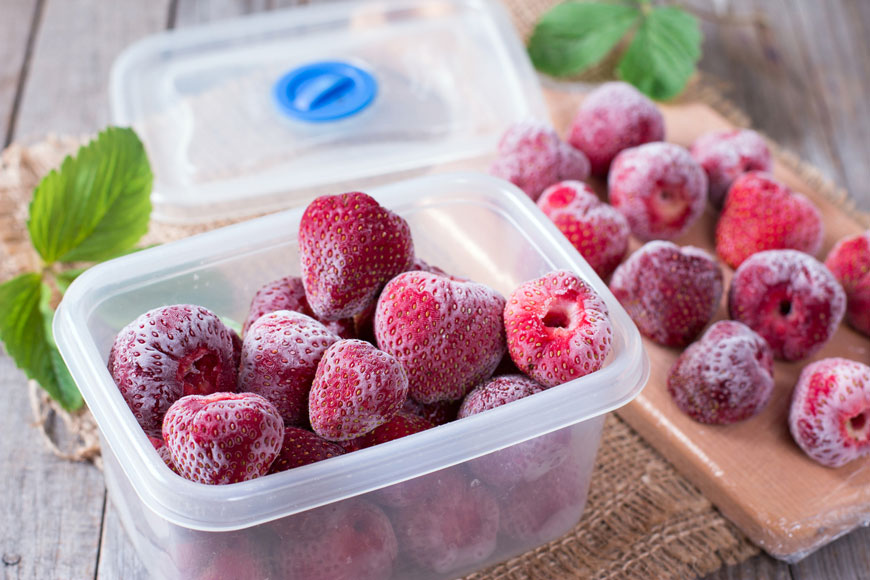Whether you have an abundance of fruit and vegetables from your garden or you’re carting home a hefty box from your farm share, you have to act fast to preserve your bounty.
Think of Leftover Fruits and Vegetables as Ingredients
Think of leftover fruits and vegetables as ingredients for future meals and strategize ways to use them up. You may have only used a couple scallions from the bunch or half of a red pepper for a meal, but both can be added to eggs for a tasty omelet the next morning. When you plan your next couple of meals, think about what fresh ingredients you have on hand and prioritize them since you have a limited amount of time before they spoil.
Here are some ideas for how to use up leftover fruits and vegetables:
- Roast a pan of vegetables — Brussels sprouts, asparagus, cauliflower, broccoli, peppers, onions, zucchini, or your favorite combo.
- Toss a salad together with an assortment of greens, grains, raw or roasted vegetables, and a fruit or two for sweetness.
- Whisk up a simple salad dressing using your leftover herbs, oil, and vinegar.
- Grill vegetables as a side to dinner, or grill some fruit for a sweet treat.
- Whip up an omelet, quiche, or frittata in no time using an assortment of herbs and vegetables — perfect for breakfast, lunch, or dinner.
- Blend berries, bananas, and greens for a nutritious smoothie.
- Make your own fresh salsa, guacamole, gazpacho, or pesto sauce.
- Bake up a crisp, crumble, or pie for dessert with fresh fruit.
Preserve Your Produce For Later Use
If you don’t need all of your fresh ingredients now, there are so many ways you can preserve them for later. And don’t by be intimidated by Chef Rich’s recommendations, as many of them are quick and easy.
-
Freeze
If you enjoy cooking with fresh herbs, you probably know they’re expensive to buy and there’s often a lot left over. And if you’re growing herbs in your garden, there will likely be a point in the summer where you have more than you can use! Rather than let them go to waste, Chef Rich recommends freezing herbs to retain their flavor. The same holds true with leftover fruits and vegetables. You can throw overripe bananas right in their peel in the freezer and save them for banana bread, pancakes, or smoothies. Freeze berries for adding to pancakes on the weekend, freeze grapes for a sweet snack on a hot day, and freeze avocado slices for a rich smoothie or pudding. With vegetables, you can freeze them sliced or diced, and you will always have ingredients on hand for a frittata or soup.
Chef Rich’s tip: Freeze herbs in ice cube trays. Fill ice cube trays with chopped fresh herbs and cover with oil, butter, or water. Once frozen, you can easily transfer them to a freezer bag for future use. You can toss the herb cubes into sauces, soups, and sautés when you need an extra punch of flavor.
-
Infuse
Use fruit, herbs, or a combination to make delicious infused drinks. It’s a refreshing way to cool off in the summer, and the combinations are endless. Plus, you’ll get flavorful drinks without the sugar and calories from juice or soda.
Chef Rich’s tip: Throw mint and lemon or lime slices in a pitcher of ice water and you have instant spa water.
-
Pickle
Pickling isn’t just for cucumbers and Doomsday Preppers. With only a few ingredients and some jars, you can quick pickle almost anything — green beans, radishes, carrots, tomatoes, beets, peaches, watermelon rinds, and more. I wouldn’t have believed it myself if I hadn’t recently tried this recipe for banh mi bowls with lemongrass meatballs. The pickled carrots only take an hour and perfectly complement this meal.
Chef Rich’s tip: Quick pickle thin slices of carrots and radishes to add to a sandwich for delicious banh mi flavor.
-
Dry
While it’s truly a personal preference, drying fruits, herbs, and vegetables is another way to preserve them for later use. There are several ways to dry herbs, using the oven, microwave, or by simply hanging them. You can also dehydrate fruits or vegetables in your oven — kale chips are much more affordable and tasty when you make them yourself!
Challenge Yourself to Limit Food Waste
Limiting food waste is not only good for the environment, but it helps you save money too. Whether you’re spending time gardening or paying for a farm share, you don’t want to waste fresh produce. Challenge yourself to use as much of the leftover produce as possible. You can even use leftover fruits and vegetables in compost, which you can then put back into your garden to nourish your fruits and vegetables.
Chef Rich’s tip: Before you throw away carrot peels, celery leaves, the tops and bottoms of tomatoes, or any other fruit, vegetable, or herb, think about how you can use it another way. Carrot peels and celery leaves may not make their way into your next salad, but they add excellent flavor to broth. The tops and bottoms of tomatoes may not look nice in your salad, but you can dice them up for salsa.
Share With Others
Your friends, neighbors, coworkers — think about who may appreciate some fresh fruits, vegetables, or herbs, and share with them. Even better, contact a local food pantry in your area to see if they accept fresh produce donations. Your leftover fruits and vegetables are not only more nutritious, but better tasting than the standard food donations of canned goods and non-perishable items.
By Susan Rossman, Independence Blue Cross


